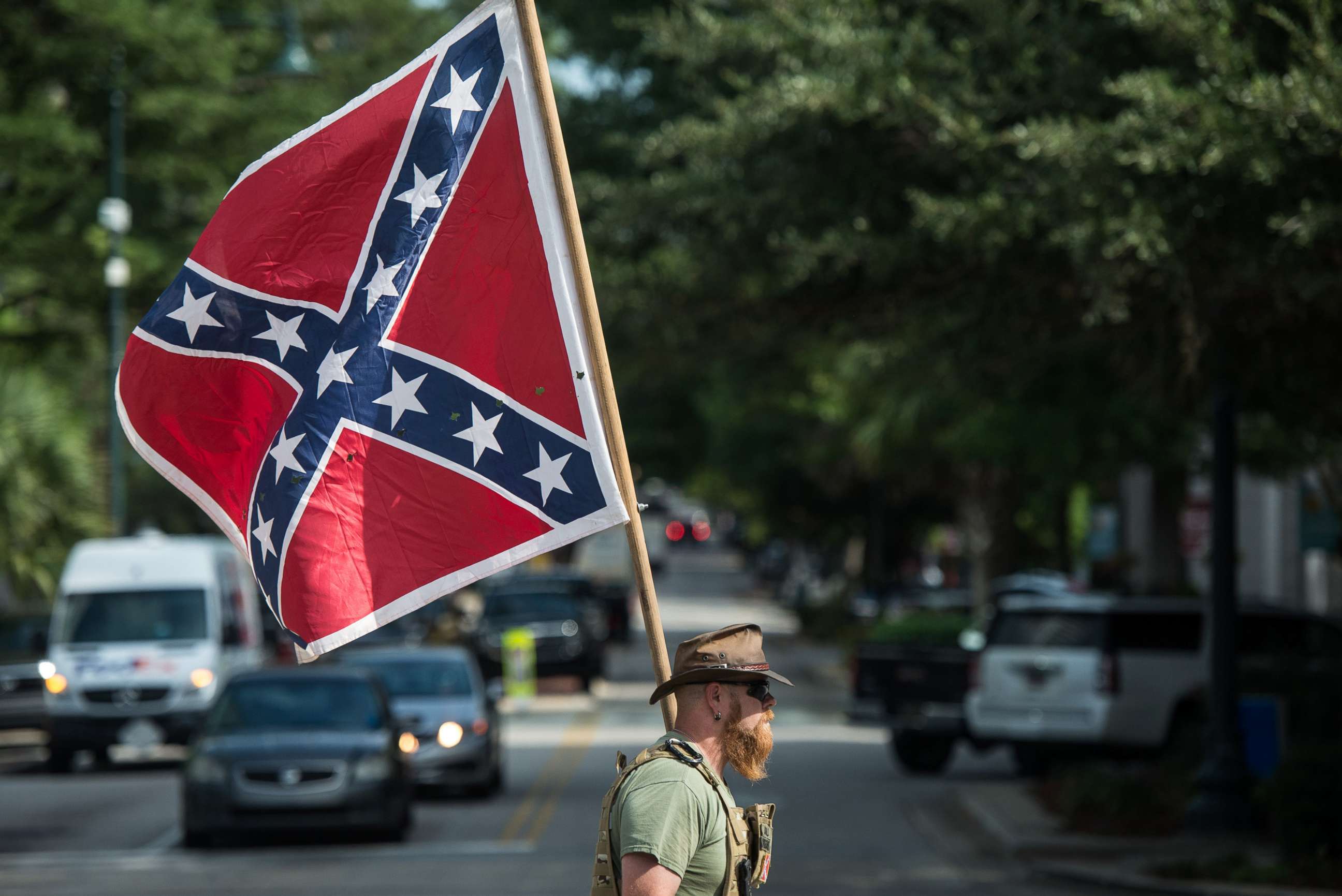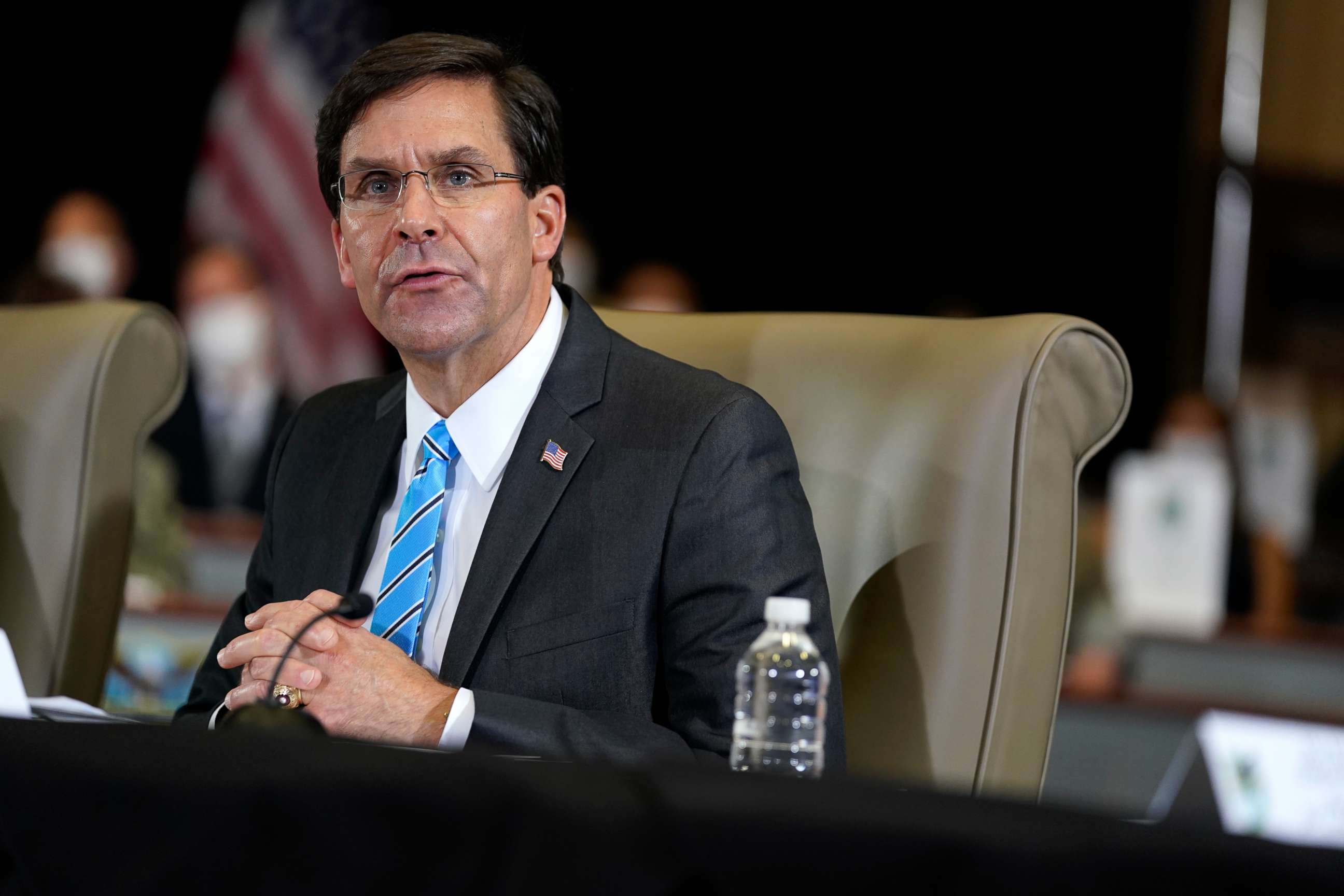Defense Secretary Esper effectively bans Confederate flag from US military bases
The move comes days after President Trump called displays "freedom of speech."
Defense Secretary Mark Esper on Friday issued a directive that effectively bans displays of the Confederate flag at U.S. military bases by not specifically mentioning it among the types of flags that are allowed to be displayed.
The move comes days after President Donald Trump called displays of the Confederate flag should be protected under the constitutional "freedom of speech."
Esper's guidance authorizes the displays of the American flag, state and territories flags, the POW-MIA flag, the flags of other countries, unit flags, senior leader flags, unit flags, and flags flown for protocol purposes.
The new guidance treads carefully around President Trump's previously stated opposition to a ban on displays of the Confederate flag by not authorizing an outright ban. Instead, displays are not allowed because it is not among the flags authorized for display and his guidance never mentions the Confederate flag.
"With this change in policy, we will further improve the morale, cohesion, and readiness of the force in defense of our great Nation," he said in a tweet announcing the move.
Just days ago, in an interview with CBS News President Donald Trump called displays of the Confederate flag "freedom of speech."

Trump's comments and his previously stated opposition to renaming Army bases named after Confederate generals have put him at odds with senior Defense Department leaders and military commanders who had expressed their willingness to discuss the changes as part of the national debate on race that followed George Floyd's death.
The Army and Navy appeared poised to carry out unilateral bans on displays of the Confederate flag, much as the Marine Corps did earlier this year. But those moves were delayed as Esper initiated the crafting of a new policy that would apply uniformly to the military services.
"Flags are powerful symbols, particularly in the military community for whom flags embody common mission, common histories, and the special, timeless bond of warriors," Esper wrote in the memo entitled "Public Display or Depiction of Flags in the Department of Defense" that was sent to senior Defense Department leaders and commanders.

"We must always remain focused on what unifies us: our sworn oath to the Constitution and our shared duty to defend the Nation," said Esper. "That is why we honor the American flag, which is the principal flag we are authorized and encouraged to display."
"The flags we fly must accord with the military imperatives of good order and discipline, treating all our people with dignity and respect, and rejecting divisive symbols," he said.
The guidance applies to "public displays or depictions of flags by service members and civilian employees in all Department of Defense work places, common access areas, and public areas."
As the Defense Department prepared its new guidance some military commanders based overseas ordered bans of the Confederate flag at their installations, including U.S. Forces Korea and U.S. Forces Japan.
In February, Gen. David Berger, the Commandant of the Marine Corps unilaterally banned the Confederate flag at Marine installations.
"It became pretty clear that some symbols were being hijacked by organizations and used a very bad, negative way...the Confederate battle flag was part of that,," Berger told ABC News Chief Global Affairs Correspondent Martha Raddatz in an interview two weeks ago.
"We're not erasing history by any means," said Berger. "It's a symbol. But the bigger symbol is the things that draw the team together so that we can operate with that kind of implicit trust. We have a flag -- it's the American flag. We have the Marine Corps colors.
We have things that unify us -- we'll be able to operate as a team," Berger said. "Anything that gets in the way of that is a problem."
“Earlier this year the Marine Corps led the way in banning the confederate flag from display on their bases. It is a good step that the Department of Defense will follow with what amounts to a blanket ban on the display of the Confederate flag," said Mick Mulroy, an ABC News consultant who is a retired Marine and former Deputy Assistant Secretary of Defense for Middle East Affairs.
The effective ban on the Confederate flag may have avoided a direct clash with President Trump, but the renaming of Army bases named after Confederate generals still looms as a potential conflict between Trump and military leaders.
Last week Joint Chiefs Chairman Gen. Mark Milley told a congressional panel that the military needed "to take a hard look at the symbols, things like Confederate flags and statues and bases."
Milley described the Confederacy as "an act of rebellion. It was an act of treason at the time against the Union, against the Stars and Stripes, against the U.S. Constitution and those officers turned their back on their oath."
"I've recommended a commission of folks to take a hard look at the bases, statues, names, all of this stuff, to see if we can have a rational and mature discussion," he said.




